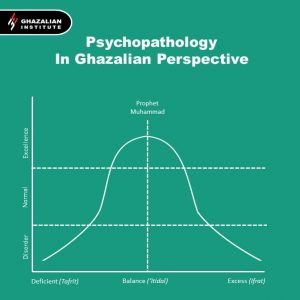Psychopathology in Ghazalian Perspective

psikologi ghazalian, islamic psychology, islamic psychotherapi, islamic cbt
The qalb or heart is like a body in that it also experiences health, sickness, and death. A sick heart, also called qalb al-marid, is a heart that is alive, but sick. This qalb still knows Allah and has love for Allah but still loves the subhah (unclear in halal or haram) and excessive in something halal that can bring Allah’s wrath. Anyone whose love exceeds love for Allah, then that person’s qalb becomes sick. The Prophet said, “Remember that in the body is a lump of flesh. If it is good, the entire body is good. If it is bad, then the entire body is bad. Remember that the lump of meat is the heart.” (HR. Bukhari). This disease is very harmful to oneself and harmful to others. Allah says, “ In their hearts is disease, so Allāh has increased their disease; and for them is a painful punishment because they [habitually] used to lie (Surat al-Baqarah 2:10).
There is another condition, qalb al-mayyit, that is, a dead heart. It is a heart that does not recognize its God, so it will lead its owner to disobey Allah and always do things that bring Allah’s wrath. It is deceived by worldly pleasures and has no intention of living in the Hereafter: “Indeed, those who do not expect to meet Us, they are pleased and satisfied with the life of the world, and they are heedless of Our verses” (Surah Yunus 10:7). Such a state of the qalb is unable to see the truth, “Verily it is not their eyes that are blind, but their hearts that are in their breasts.” (Surah Al-Hajj 22:46).
Diseases of the heart are different from diseases of the body. Diseases of the body will end when death occurs, whereas diseases of the heart not only affect the body but will continue after death because the human soul is eternal and will be held accountable.
Diseases of the heart are difficult to realize because most are often ignored, and when someone is aware of the disease in general, they will deny it and are not willing to let go of the disease because it is contrary to hawa nafs; in other words, desire likes it. Heart diseases make it difficult for the soul to take on the role of applying knowledge and wisdom, knowing and loving Allah, worshiping Him, and remembering His Name. The knowledge of this disease in modern psychology is called psychopathology. According to al-Ghazali, several factors can cause an imbalance in the soul and cause heart disease:
- Absence of Knowledge and True Faith: The heart was created to acquire knowledge of Allah (ma’rifah Allah), love for Allah (mahabbah) and feel happiness and satisfaction in worshiping Allah, as He says, “And I did not create the jinn and mankind but that they should serve Me.” (Surah adh-Dhariyat 51:56). Lack of proper knowledge about Allah and Islam leads to weak faith, and lack of knowledge about things that cause sickness and death in the heart causes one to neglect the well-being of the heart. This lack of knowledge can easily influence a person by negativity and lead to actions that contradict the principles of religion. Knowledge of Allah is the foundation of faith and Islam. When a person does not have the correct understanding of Allah, they may be susceptible to confusion, doubt, or unnecessary fear. Understanding Allah’s attributes, His power, and His role in life is important in understanding the world, helping individuals understand their purpose in life, and providing a positive outlook towards challenges and temptations. “We will surely test you with some fear, hunger, want of wealth, souls, and fruits. And give glad tidings to the patient ones, who, when afflicted with calamity, say: ‘Inna lillahi wa inna ilaihi raji’un.” (Q.S. Al-Baqarah 2:155-156).
- Excessive love for worldly things: This refers to a situation where a person loves aspects of the world, such as wealth, position, or material pleasures, more than they love Allah. When the love for worldly things exceeds the love for Allah, then the heart is not connected to Allah and will decrease its devotion to Allah, this excessive love can come from education and habituation. The sign of man’s love for Allah above all things in this world is: “Say: If your fathers, your children, your brothers, your wives, your relatives, the wealth you work for, the business you fear losing, and the houses you love to live in, are dearer to you than Allah and His Messenger and Jihad in the cause of Allah, then wait until Allah brings His judgment, and Allah does not guide those who disbelieve.” (Surat At-Taubah 9:24)..
- Experiences such as fear and hope: According to al-Ghazali, the present, past, and future dimensions of time can influence an individual’s preferences and feelings towards things liked or disliked, which can lead to heart disease. Memories from the past, feelings in the present, and hope for the future play a role in shaping an individual’s views and reactions to situations. Memories from the past have a major impact on how individuals respond and assess the current situation. Pleasant or traumatic experiences in the past can influence perceptions of everyday events. These memories can shape beliefs, hopes, or fears, which, in turn, affect emotional balance and mental health. The feelings and emotions that a person experiences in the present also play an important role in shaping their view of the world. Emotions such as happiness, sadness, anger, or anxiety can affect how a person interprets and responds to situations. Strong emotions can dominate perceptions and make individuals vulnerable to extreme emotional reactions, such as mood disorders and generalized anxiety disorder. Likewise, future expectations can shape an individual’s view of life and goals. When expectations are not met or there is a mismatch between expectations and reality, this can trigger feelings of disappointment or even hopelessness, leading to major depressive disorder. Allah says the Qur’an affirms: “ And spend in the way of Allāh and do not throw [yourselves] with your [own] hands into destruction [by refraining]. And do good; indeed, Allāh loves the doers of good.” (Surat Al-Baqarah 2:195).
Mental illness or marad an-nafsi is more often expressed by al-Ghazali with the word disease of the heart or amrad al-qulub which is defined in ‘Ihya ‘Ulumuddin as a condition of imbalance of the soul when the impulse of shahwah, ghadab or ‘aql is in a state of excess (ifrat) or too deficient (tafrit). Imbalance leads to a variety of significant psychological disorders, especially in akhlaq.
The lust (shahwah) drive refers to worldly desires and bodily pleasure. If this drive is excessive, individuals can be caught up in greed, addiction, or selfish actions that harm themselves and others. Conversely, if these urges are too minimal, individuals may lose interest in their daily lives and tend to be passive to challenges.
The ghadab drive refers to a response to something that is annoying or against one’s will. If this drive is excessive, individuals may become irritable, respond to violence, or find it difficult to control their emotions. However, if this drive is deficient, individuals may tend to be passive and unable to stand up for their rights.
The ‘aql drive involves rational thinking and decision making. If this drive is excessive, the individual may tend to be overly analytical, overly skeptical, or have difficulty making decisions due to the excessive consideration of options. If this drive is too minimal, individuals may become less critical thinkers, be less responsive to problems, or ignore the consequences of their actions.
Imbalances in these drives can result in a variety of serious psychological disorders. For example, someone who experiences an imbalance in excessive shahwah drives may develop eating disorders, such as bulimia or substance addiction. Someone who has uncontrolled ghadab drive may suffer from Intermittent Explosive Disorder, which affects their social relationships. Meanwhile, individuals with an extreme imbalance of the ‘aql drive may experience chronic anxiety or personality disorders. In Al-Ghazali’s view, bad akhlaq is a direct manifestation of heart disease. Bad akhlaq arises as a result of an imbalance in the drives of the soul and can interfere with an individual’s relationship with fellow human beings and Allah. In Ghazalian psychology, psychopathology is categorized into three major groups: shahwah disorder, ghadab disorder, and ‘aql disorder, the explanations of which will be provided in the subsequent article, or you may refer to the book ‘Ghazalian Psychology: The Science of Akhlaq’ for further insights. And you can find this ebook on Paperback link: https://www.amazon.com/
and E-Book link: https://www.etsy.com
